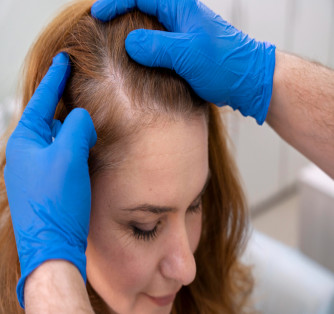Menu
Weight loss
Hormones
Sex
EXPLORE
MEET NU IMAGE MEDICAL
TREATMENTS
MEET NU IMAGE MEDICAL
TREATMENTS
MEET NU IMAGE MEDICAL
Everything You Need To Know About Finasteride For Women


It’s time we talk about hair loss, and not just receding hairlines and male pattern baldness. Women experience it too, and the results can be just as devastating. According to the Journal of the American Academy of Dermatology, around 40% of women will experience female pattern hair loss (FPHL) by the age of 50. And while it’s considered normal for men to experience and get treatment for hair loss, the same isn’t true for women. The fact that female hair loss is largely unrecognized can increase depression and image issues.
Among popular hair loss treatment options are Minoxidil and Finasteride, which are two of the key ingredients in our own proprietary hair-loss remedy, NuDew. Finasteride, commonly sold under the brand name Propecia, can be taken by men and women to help treat hair loss. As with many medications, how finasteride works for women varies, including the effectiveness and side effects.
Can Women Take Finasteride?
Women can safely take Finasteride to help fight hair loss; however, studies seem to suggest that women may need to take higher doses than men. In one study, post-menopausal women saw an increase in hair thickness and density when they took 2.5 mg to 5 mg of Finasteride, according to the International Journal of Trichology. The good news is that this dose did help promote hair growth for women and it was well tolerated.
It’s important to note that Finasteride is not safe to use during pregnancy. So women taking Finasteride should be extra cautious regarding contraception.
Hormonal Effects of Finasteride on Women
Finasteride works by blocking the 5-alpha-reductase enzyme. This is the enzyme responsible for converting testosterone into dihydrotestosterone, most commonly referred to as DHT. DHT causes hair follicles to shrink and is one of the recognized causes for hair loss in both men and women. Because taking Finasteride reduces the amount of DHT in the body, it can help reduce the hair loss associated with it.
Finasteride works by impacting the hormones that cause some types of hair loss, so it is important that women are especially careful when taking it. Finasteride should not be taken by women that are pregnant or trying to become pregnant because of the potential for birth defects especially on male babies. Women should also be cautious of their own hormone levels when taking finasteride because it can cause an increase of estrogen.
Medical Studies on Finasteride For Women
DHT causes hair follicles to shrink, which can lead to hair loss for men and women. Because Finasteride blocks the conversion of testosterone to DHT, it can stop the associated hair loss. While it's easy to think that only men have problems with excess testosterone and DHT, it’s not true.
The DHT-reducing action of finasteride makes it effective for anyone who is experiencing hair loss caused by DHT, including women. There are some treatment differences between men and women taking finasteride. Studies suggest that effective doses of Finasteride for women start at 2.5 mg, which is higher than what most men need. Even at a higher dose, side effects tend to be mild, but always discuss concerns with your prescribing physician.
Women’s Finasteride Side Effects
Along with the intended effects, all medications have the potential for side effects. Women taking Finasteride to fight hair loss may experience some of the following general side effects:
-
Decreased libido
-
Headaches
-
Breast tenderness
-
Excess hair growth
Less common side effects include dizziness or lightheadedness, swelling, weight gain or weight loss, and tingling in the hands and feet. Most side effects are mild and do not require medical attention or require you to stop the medication. Patients taking Finasteride may notice that side effects lessen with continued use. It’s important to alert your doctor to the side effects you experience while taking any medication.
Hair loss is an issue that deserves the same attention in women as it does for men. For far too long, women experiencing hair loss have had limited options, often being told that it's just something they have to live with. Fortunately, that’s simply not true and women can leverage many of the same tools men do, including finasteride, to fight back against hair loss.
Are you ready to talk to a doctor about hair loss? Begin your confidential and secure medical intake form. One of our U.S.-based physicians will review your information and determine what hair-loss treatment may be best for you. No office appointment is necessary; all doctor-patient appointments are handled via digital doctor visits, and all of our medical staff is located within the continental United States.
This article is for informational purposes only and does not constitute medical advice. The information contained herein is not a substitute for and should never be relied upon for professional medical advice. Always talk to your physician about the risks and benefits of any treatment. Nu Image Medical may not offer the medications or services mentioned in this article.
